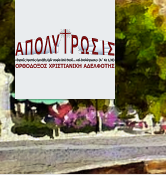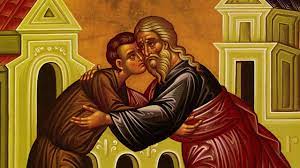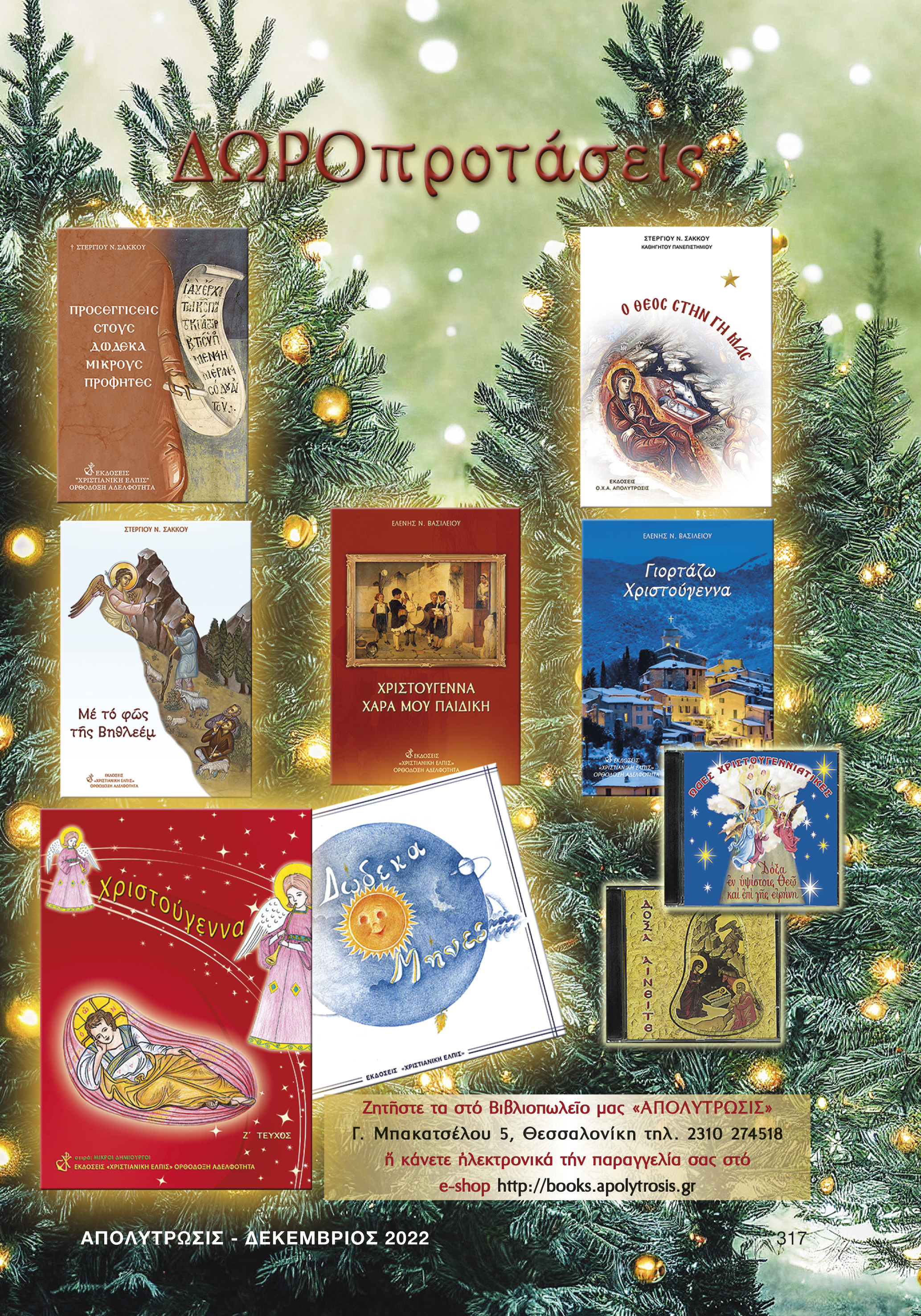 ΑΠΟΛΥΤΡΩΣΙΣ
ΧΡΙΣΤΙΑΝΙΚΗ ΟΡΘΟΔΟΞΗ ΑΔΕΛΦΟΤΗΣ
ΑΠΟΛΥΤΡΩΣΙΣ
ΧΡΙΣΤΙΑΝΙΚΗ ΟΡΘΟΔΟΞΗ ΑΔΕΛΦΟΤΗΣ
Super User
The Parable of the Prodigal Son / of the Compassionate Father
St John Chrysostom answers questions about the Birth of Christ (Nativity)
Selected excerpts from the Saint’s sermons on passages from the Gospel according to St Matthew
♦ How is it evident that He is a Descendant of David?
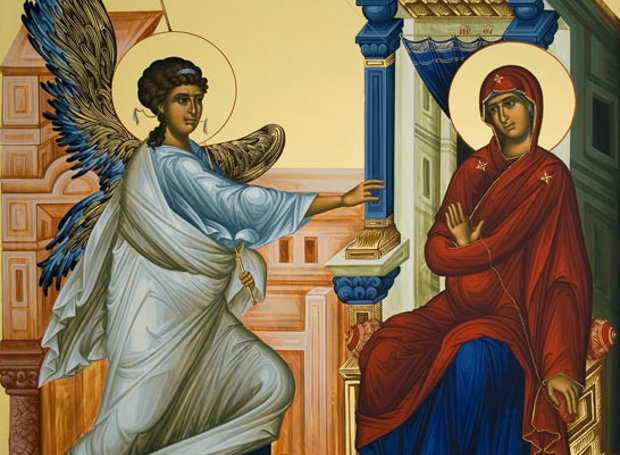 In the Gospel according to St Luke (1:27) we read the command God gives to Gabriel to go “to a virgin engaged to a man named Joseph, a descendant of David”. What is then clearer than this, when we hear that the Virgin descends from the line and family of David? Both Joseph and Virgin Mary came from the royal line of King David. It was the custom of the Jews to include only men in their genealogies, so from the genealogy in the Gospel according to St Matthew (1:16) we are assured that Joseph descends from the royal family of David. In the Old Testament it was not only forbidden to take a wife from another tribe, but also from another family. Therefore, whether we attribute the phrase “a descendant of David” to the Virgin or Joseph, their common origin is certain.
In the Gospel according to St Luke (1:27) we read the command God gives to Gabriel to go “to a virgin engaged to a man named Joseph, a descendant of David”. What is then clearer than this, when we hear that the Virgin descends from the line and family of David? Both Joseph and Virgin Mary came from the royal line of King David. It was the custom of the Jews to include only men in their genealogies, so from the genealogy in the Gospel according to St Matthew (1:16) we are assured that Joseph descends from the royal family of David. In the Old Testament it was not only forbidden to take a wife from another tribe, but also from another family. Therefore, whether we attribute the phrase “a descendant of David” to the Virgin or Joseph, their common origin is certain.
This righteous and virtuous man, distinguished for his great compassion, he who did not pursue the Virgin’s punishment, could not have possibly transgressed the Law about marriage. He who showed a level of spirituality higher than what the Law required, as revealed by his plan to divorce the Virgin secretly, could not have possibly broken the Law in choosing his wife, when indeed he was not compelled by any reason to do so.
♦ Why is Joseph included in the genealogical tree of Jesus Christ since he did not really have Virgin Mary as his wife?
The phrase “Joseph, the husband of Mary (Mt. 1:16) in the genealogy of Joseph, after naming all his ancestors, indicates that the Evangelist included him in the genealogy because of Mary. But lest you should think that the birth of Jesus Christ occurred following the natural law, when hearing the phrase “husband of Mary”, he presents the miraculous and supernatural way of the virginal conception of Jesus as follows: “After His mother Mary was engaged to Joseph, before they came together, she was found with child by the Holy Spirit” (Mt. 1:18).
The Jews should not have known at the time of the Nativity that Christ was born of a Virgin so that the Virgin could be saved and be free of any immoral suspicion. Because, if this had been known to the Jews from the very beginning, they would have condemned the Virgin for adultery and sentenced to death by stoning. Since Joseph himself, who was both a pious and admirable man, needed many proofs to believe what happened, namely the appearance of an angel and the revelation in his dream along with the testimonies of the prophets, how would it be possible for the Jews, being stiff-necked, wicked and fanatical enemies of Him, to accept this unbelievable event? They would be scandalized by this paradoxical and incredible event similar of which had not been witnessed in the past. “Her husband Joseph, being a righteous man and unwilling to disgrace her, decided to divorce her secretly.” says Matthew (1:19)
Do you see how merciful this man was? Not only did he not punish her but also, he did not denounce to anybody nor did he even say anything to the Virgin whom he considered a suspect. Instead, he was thinking to himself while trying to hide the accusation even from the Virgin herself. To that end the Evangelist did not say “sent her away from his house” but “dismiss her”. He planned to divorce her. He was such a merciful, polite and decent man, righteous in all things, that he did not want to cause any discomfort to the Virgin, not even the slightest one. Since however, he believed that it was unethical to have her in his house, while at the same time her public shaming would have resulted in a death penalty, he showed superior behavior. He “decided to divorce her secretly”.
♦ Why did the Virgin keep it quiet, when she was informed by the angel and why did she not disclose it to her suitor when she saw him confused?
That is because she thought that she would not be believed by her suitor, if she announced such oddity. On the contrary, she would be likely to enrage him more as he might have thought that she was trying to cover up her committed sin. Since even she who was about to take on such a divine mission, becomes agitated and asks “How is this to me, when I do not know a man?” much more would Joseph have expressed doubts given that he would have been informed by the Virgin herself. While the situation was like this and everything had reached deadlock, the angel appeared providing solution to all of the problems. “While he (Joseph) contemplated this, an angel of the Lord appeared to him in a dream” (Mt 1:20).
♦ Why didn't the angel speak to Joseph before he was troubled?
So that he does not become mistrustful and suffer the same as Zacharias did. For he would have easily believed after pregnancy could be seen. But this news would not be equally accepted before it had even begun. It is for this reason he is notified by the angel, after his soul had been possessed by this very suspicion which is meant to become the proof of the truth of what would be said. Hearing the angel revealing his secret thoughts and feelings which he had not shared with anyone else, was for him the undisputed proof that the angel speaking to him had been sent by God because only God has the power to know the secrets of the soul. The angel came to Joseph and said “Joseph, son of David, do not be afraid to take Mary your wife, because the child conceived in her is from the Holy Spirit.” (Mt 1:20)
He immediately evokes Joseph’s ancestors, by addressing him as son of David, whose line Christ was to come from, and does not let him feel anxiety, since he reminds him of the promise, which had been given to mankind. By saying “do not be afraid” he indicates that Joseph was seized with fear of displeasing God if he lived together with an adulteress. For no other reason would he have planned to send her away from his home. After the name of the Virgin had been mentioned, the angel did not stop and added “your wife”. It is certain that he wouldn't have called her this way if she had been corrupt and immoral. His fiancée is here called his wife. In the Bible the suitors are called “husbands” even before their marriage.
♦ But what is meant by “to take Mary your wife”?
To keep her in his house, because Joseph had already pushed her away with his thought. The woman you have removed from your life, is handed over to you to keep at home, not by her parents but by God. However, He gives her to you, through my own voice, not as a wife, but to simply dwell with her. Just as later Christ hands over His Mother to His disciple so now the angel entrusts her to the protection of Joseph.
Thus, he neither criticized her nor considered her immoral but he recognized her as his fiancée and also ministered to her after childbirth. If the man who more than anybody would be interested in her spousal loyalty had not been convinced that the newborn child came through the energy of the Holy Spirit, he would not have held her in his house and would not have served her in all things.
The evangelist Matthew has previously mentioned with emphasis the phrase “she was found with child”. The phrase “was found” or “happened” is usually said about paradoxical and entirely unexpected, rather impossible events. Mary was found with a baby in her womb in a supernatural way. The angel tells Joseph: “the child conceived in her is from the Holy Spirit” (Mt 1:20). “Therefore, you must not only banish your fear altogether, but also rejoice exceedingly.” These sayings are paradoxical, are beyond human logic and are above and beyond the natural laws.
♦ But how could Joseph believe all these words never heard before?
Certainly, from what had already been revealed by the angel. It is for this reason that the angel reveals to Joseph all things he had contemplated, suffered, feared as well as everything he had thought of doing in order to be sure of this for the present matter. And he is not only convinced by the past events, but also by the ones to come. “She will give birth to a son, and you will name him Jesus” (Mt 1:21). Do not however think that, because His birth is caused by the power of the Holy Spirit, you will not commit yourself to offer the newborn child your services as the head of family. Even though you had no genetic role to the birth of the child and the Virgin remained intact, I entrust you with the task of the father, which does not violate the character of the Virgin Mary, to give the name to the child. So, you will name the child. Even if the child is not yours, you will act as a true father for Him assuming the duties that belong to a father. Therefore, I entrust you to give the name to Him in order to immediately relate you to the newborn.
Now listen how precisely the evangelist settles all the rest so that no one might suspect that Joseph is the biological father. Matthew says “She will give birth to a son”. He does not say, “She will bear you a son,” but simply “She will give birth” leaving the phrase unspecified, for she would not bear a child for Joseph, but for the whole world. For this reason, the angel came from heaven, sent by God, to bring the name of the newborn to Joseph, as a proof that the pregnancy of Virgin Mary was due to the miraculous power of the Holy Spirit.
ΑΝΟΙΚΤΗ ΕΠΙΣΤΟΛΗ ΠΡΟΣ ΒΟΥΛΕΥΤΕΣ ΘΕΣΣΑΛΟΝΙΚΗΣ
Με αφορμή την επικείμενη ψηφοφορία νόμου
για την αναγνώριση «γάμου» σε ομοφυλόφιλα ζευγάρια
Κυρίες και κύριοι Βουλευτές
Απευθυνόμαστε σε σας γιατί είστε οι δικοί μας άνθρωποι που τη συγκεκριμένη ιστορική στιγμή μας εκπροσωπείτε στη Βουλή. Σας εκλέξαμε εκτιμώντας την προσωπικότητά σας, τα προσόντα σας, αλλά κυρίως γιατί πιστέψαμε ότι είστε τα πρόσωπα που μπορούν να εκφράσουν τη θέλησή μας και να υπερασπίσουν τα δικαιώματά μας στο κέντρο λήψης αποφάσεων της χώρας.
Γι’ αυτό σας ζητούμε, λαμβάνοντας σοβαρά υπ’ όψη σας ότι αποτελούμε ένα σημαντικό ποσοστό των ψηφοφόρων στην Μακεδονία, η οποία διακρίνεται για τη θρησκευτικότητα και την προσήλωσή της στην ελληνορθόδοξη παράδοση, να ακούσετε το αίτημά μας:
Καταψηφίστε το νομοσχέδιο της ντροπής!
Αρνηθείτε να συμμετάσχετε στην καταστροφή του πολιτισμού που χτίστηκε στηριγμένος σε θεσμούς και αξίες, του πολιτισμού που ανύψωσε τον άνθρωπο σε προσωπικότητα με ανυπέρβλητη αξία ως εικόνα του Θεού!
Αντισταθείτε στη λαίλαπα της ισοπέδωσης!
Μην υποκύπτετε στην παγκόσμια τρομοκρατία του ιδεολογικού φασισμού της ΛΟΑΤΚΙ ατζέντας που προσπαθεί να σας υποτάξει με απειλές και δελεάσματα!
Αρθείτε στο ύψος που απαιτεί η ιστορική συγκυρία.
Δεν δίνονται συχνά ευκαιρίες να γράψει κανείς ηρωικές σελίδες στο βιογραφικό του. Η στάση σας κατά την ψήφιση του σχετικού νομοσχεδίου σάς προσφέρει τη δυνατότητα να κάνετε τη διαφορά, να βγείτε από τη μάζα των άβουλων και κατευθυνόμενων και να σταθείτε ανάχωμα στον βιασμό της φύσης, στην ανατροπή των αξιών, στην απαξίωση του ανθρώπινου προσώπου.
Δεν θα επιχειρηματολογήσουμε πέραν των όσων η Ιερά Σύνοδος της Ιεραρχίας της Εκκλησίας της Ελλάδος στην εμπεριστατωμένη εγκύκλιό της με νηφαλιότητα και παρρησία παρουσίασε ως τη θέση του Ευαγγελίου, με τις συνεπακόλουθες πνευματικές, κοινωνικές και εθνικές διαστάσεις του θέματος.
Εμείς εκφράζουμε την απαίτησή μας να γίνει σεβαστή από την Κυβέρνηση και όλο το νομοθετικό σώμα, όχι η δική μας άποψη, αλλά η εντολή του Θεού. Η συντριπτική πλειονότητα του πολιτικού κόσμου, από τον πρωθυπουργό μέχρι και τον τελευταίο σε ψήφους βουλευτή, είστε βαπτισμένοι χριστιανοί ορθόδοξοι. Κι αυτό είναι το ίδιον της Ελληνικής Βουλής. Γι’ αυτό είναι άστοχη και παραπειστική κάθε σύγκριση με τα λεγόμενα «προοδευτικά» κράτη που δέχτηκαν μια τέτοια νομοθεσία. Η Ελλάδα -τουλάχιστον μέχρι σήμερα- διατηρεί την ιδιοπροσωπία της κι αποτελεί ακόμη σημείο αναφοράς για τη συνοχή των οικογενειακών δεσμών, για τη θαλπωρή και την ανθρωπιά που καλλιεργούνται στο υγιές οικογενειακό περιβάλλον. Στη διατήρηση αυτού του υγιούς οικογενειακού περιβάλλοντος οφείλει η πολιτεία να στρέψει την προσοχή της και για την ενίσχυσή του να λάβει μέτρα και όχι να ψηφίζει νόμους που δυναμιτίζουν τον ιερό θεσμό της οικογένειας.
Μην πριονίζετε τις ρίζες του δένδρου που σας τρέφει!
Μην κόβετε τις φλέβες που σας μετάγγισαν τη ζωή
και πάνω απ΄ όλα :«Μὴ προσκρούετε Θεῷ».
Αγαπητές και αγαπητοί Βουλευτές της Θεσσαλονίκης,
Το βουλευτικὸ αξίωμα δεν σημαίνει μόνο τιμή· σημαίνει πρωτίστως ευθύνη. Κι εδώ η ευθύνη είναι τόσο μεγάλη, όσο το βάρος της ιστορίας αυτού του Έθνους.
Υπάρχουν στιγμές που ζυγίζουν αιώνες, είναι τότε που ένα «ναι» ή ένα «όχι» μπορεί να καταξιώσει ή να απαξιώσει ολόκληρη τη ζωή του ανθρώπου. Μια τέτοια στιγμή στη δική σας ζωή είναι τώρα: η ώρα που θα κληθείτε να τοποθετηθείτε θετικά ή αρνητικά στο προτεινόμενο νομοσχέδιο.
Ευχόμαστε να μην απογοητεύσετε τους ψηφοφόρους σας.
Η αποχή δεν είναι λύση αλλά φυγομαχία!
Οφείλετε να είστε παρόντες και να επιλέξετε με αίσθημα ευθύνης απέναντι στην ιστορία, ώστε να μη σας συγκαταλέξει στους Εφιάλτες.
Κανένας χριστιανός βουλευτής δεν μπορεί να ψηφίσει το συγκεκριμένο νομοσχέδιο, καταπατώντας συνειδητά και εν γνώσει του τον Νόμο του Ευαγγελίου.
Το νομοσχέδιο αυτό αποτελεί για τον χριστιανικό λαό της Ορθόδοξης Ελλάδας «κόκκινη γραμμή» και η μη καταψήφισή του θα επιφέρει σοβαρό πλήγμα στη μεταξύ μας σχέση εμπιστοσύνης.
Θεσσαλονίκη 12 Φεβρουαρίου 2024
Τα Ορθόδοξα Χριστιανικά Σωματεία της Θεσσαλονίκης
ΑΔΕΛΦΟΤΗΣ ΟΡΘΟΔΟΞΟΥ ΕΞΩΤΕΡΙΚΗΣ ΙΕΡΑΠΟΣΤΟΛΗΣ
ΓΟΝΕΩΝ ΕΝΩΣΙΣ ΧΡΙΣΤΙΑΝΙΚΗ ΑΓΩΓΗ (Γ.Ε.Χ.Α.)
ΕΛΛΗΝΟΡΘΟΔΟΞΟΣ ΣΥΝΔΕΣΜΟΣ «ΟΙ ΠΑΝΑΓΙΟΦΙΛΟΙ»
«ΕΝΩΜΕΝΗ ΡΩΜΗΟΣΥΝΗ»
ΟΡΘΟΔΟΞΟΣ ΧΡΙΣΤΙΑΝΙΚΗ ΑΔΕΛΦΟΤΗΣ «ΑΓΑΠΗ ΧΡΙΣΤΟΥ»
ΟΡΘΟΔΟΞΟΣ ΧΡΙΣΤΙΑΝΙΚΗ ΑΔΕΛΦΟΤΗΣ «ΑΓΙΑ ΦΟΙΒΗ»
ΟΡΘΟΔΟΞΟΣ ΧΡΙΣΤΙΑΝΙΚΗ ΑΔΕΛΦΟΤΗΣ «ΑΠΟΛΥΤΡΩΣΙΣ»
ΟΡΘΟΔΟΞΟΣ ΧΡΙΣΤΙΑΝΙΚΗ ΑΔΕΛΦΟΤΗΣ «ΛΥΔΙΑ»
ΟΡΘΟΔΟΞΟΣ ΧΡΙΣΤΙΑΝΙΚΗ ΑΔΕΛΦΟΤΗΣ «ΟΣΙΑ ΞΕΝΗ»
Ο.Χ.Α. «ΑΓΙΑ ΤΑΒΙΘΑ»
ΠΑΓΚΟΣΜΙΑ ΑΚΑΔΗΜΙΑ ΤΗΣ ΡΩΜΙΟΣΥΝΗΣ: ΙΕΡΟΣ ΣΥΝΔΕΣΜΟΣ (Π.Α.Τ.Ρ.Ι.Σ.)
ΠΑΝΕΛΛΗΝΙΟΣ ΣΥΝΔΕΣΜΟΣ ΒΟΡΕΙΟΗΠΕΙΡΩΤΙΚΟΥ ΑΓΩΝΑ (ΠΑ.ΣΥ.Β.Α.)
ΠΑΡΑΚΑΤΑΘΗΚΗ (ΠΑΝΕΛΛΗΝΙΟΣ ΣΥΝΔΕΣΜΟΣ ΓΙΑ ΤΗΝ ΕΛΛΗΝΟΡΘΟΔΟΞΗ ΠΑΡΑΔΟΣΗ)
ΠΡΩΤΟΒΟΥΛΙΑ ΓΟΝΕΩΝ ΒΟΡΕΙΟΥ ΕΛΛΑΔΟΣ
ΠΡΩΤΟΒΟΥΛΙΑ ΠΟΛΙΤΩΝ ΓΙΑ ΤΗΝ ΠΝΕΥΜΑΤΙΚΗ ΕΛΕΥΘΕΡΙΑ
ΣΥΛΛΟΓΟΣ «Ο ΑΠΟΣΤΟΛΟΣ ΠΑΥΛΟΣ»
ΣΥΛΛΟΓΟΣ ΟΡΘΟΔΟΞΟΥ ΙΕΡΑΠΟΣΤΟΛΙΚΗΣ ΔΡΑΣΕΩΣ «Ο ΜΕΓΑΣ ΒΑΣΙΛΕΙΟΣ»
ΣΥΛΛΟΓΟΣ ΠΟΛΥΤΕΚΝΩΝ ΝΟΜΟΥ ΘΕΣΣΑΛΟΝΙΚΗΣ «ΑΓΙΟΙ ΠΑΝΤΕΣ»
ΣΥΛΛΟΓΟΣ ΦΙΛΩΝ Ι.Μ. ΠΑΝΤΟΚΡΑΤΟΡΟΣ ΜΕΛΙΣΣΟΧΩΡΙΟΥ «ΑΓ. ΓΡΗΓΟΡΙΟΣ Ο ΠΑΛΑΜΑΣ»
ΣΥΝΤΟΝΙΣΤΙΚΗ ΦΟΙΤΗΤΙΚΗ ΕΝΩΣΗ ΒΟΡΕΙΟΗΠΕΙΡΩΤΙΚΟΥ ΑΓΩΝΑ (Σ.Φ.Ε.Β.Α.)
ΦΙΛΑΝΘΡΩΠΙΚΟ ΣΩΜΑΤΕΙΟ «ΜΕΡΙΜΝΑ ΠΤΩΧΩΝ»
«ΧΡΙΣΤΙΑΝΙΚΗ ΕΛΠΙΣ» ΟΡΘΟΔΟΞΗ ΑΔΕΛΦΟΤΗΤΑ
ΧΡΙΣΤΙΑΝΙΚΗ ΕΝΩΣΗ ΓΟΝΕΩΝ ΘΕΣΣΑΛΟΝΙΚΗΣ
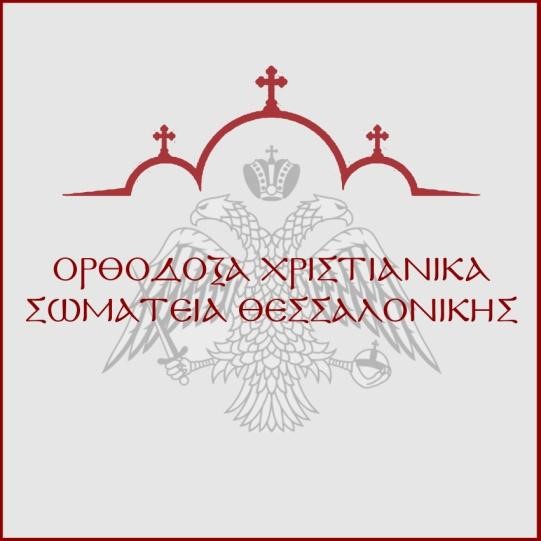
ΔΕΛΤΙΟ ΤΥΠΟΥ
Πραγματοποιήθηκε στίς 11 Φεβρουαρίου 2024 καὶ ὥρα 4 μ.μ. στὸ Βελλίδειο Συνεδριακὸ Κέντρο τῆς Θεσσαλονίκης μεγαλειώδης συγκέντρωση στήριξης τῆς παραδοσιακῆς οἰκογένειας. Διοργανώθηκε ἀπὸ τὸ Συντονιστικὸ τῶν Ὀρθοδόξων Χριστιανικῶν Σωματείων τῆς πόλεως ὑπὸ τὴν αἰγίδα καὶ εὐλογία τῶν Ἱερῶν Μητροπόλεων Θεσσαλονίκης, Νεαπόλεως & Σταυρουπόλεως καὶ Νέας Κρήνης & Καλαμαριᾶς.
Ἡ ἐκδήλωση εἶχε γενικὸ τίτλο:
«ΑΝΔΡΑΣ - ΓΥΝΑΙΚΑ : ΓΑΜΟΣ
ΠΑΤΕΡΑΣ - ΜΗΤΕΡΑ: ΟΙΚΟΓΕΝΕΙΑ
ΩΡΑ ΕΥΘΥΝΗΣ»
Χιλιάδες κόσμου κατέκλυσαν κυριολεκτικὰ τὸ Βελλίδειο καὶ ὑπῆρχαν πολλοὶ ποὺ παρακολούθησαν τὴν ἐκδήλωση ἀπὸ τὸν προαύλειο χῶρο. Ἐντυπωσιακὴ ἡ παρουσία τῆς νεολαίας.
Παρόντες οἱ μητροπολῖτες Ἐδέσσης, Πέλλης καί Ἀλμωπίας κ. Ἰωήλ, Πολυανῆς καί Κικλισίου κ. Βαρθολομαῖος, Λαγκαδᾶ, Λητῆς καί Ρεντίνης κ. Πλάτων, ἐκπρόσωποι ἄλλων μητροπολιτῶν, ἡγούμενοι ἱερῶν Μονῶν, μοναχοί καί μοναχές, μέλη ἱεραποστολικῶν Ἀδελφοτήτων.
Ἐκπρόσωπος τοῦ Συντονιστικοῦ τῶν Σωματείων ἀναφέρθηκε στήν ἀρχή μὲ συντομία στὸ ἱστορικὸ διοργάνωσης παρόμοιων ἐκδηλώσεων θρησκευτικοῦ, ἐθνικοῦ καὶ κοινωνικοῦ χαρακτήρα, πάντοτε σὲ συνεργασία μὲ τὴν Ἐκκλησία, καὶ εὐχαρίστησε τοὺς συμμετέχοντες γιὰ τὴν παρουσία τους.
Τὴν εὐλογία τοῦ Ἁγιωνύμου Ὄρους, καθὼς καὶ τὴν ἀγωνία τῶν μοναχῶν γιὰ τὸ προωθούμενο νομοσχέδιο, μετέφερε στή συνέχεια ὁ καθηγούμενος τῆς Ἱερᾶς Μονῆς Σίμωνος Πέτρας πανοσιολογιώτατος ἀρχιμανδρίτης Ἐλισαῖος μὲ τόν ἐμπνευσμένο χαιρετισμό του.
Κύριοι ὁμιλητὲς ἦταν ὁ Σεβασμιώτατος Μητροπολίτης Λαρίσης καὶ Τυρνάβου κ. Ἱερώνυμος, ποὺ ἀνέπτυξε τὸ θέμα «Ἄρχοντες κατεδίωξάν με δωρεάν», ὁ πρωτοπρεσβύτερος π. Νικόλαος Χαμαμτζόγλου, κληρικὸς τῆς Ἱ. Μ. Θεσσαλονίκης, μὲ θέμα: «Γάμος-Οἰκογένεια: Ὅρια Πατέρων μετέθηκας;», καὶ ἡ καθηγήτρια Ἰατρικῆς τοῦ Α.Π.Θ. κ. Μαγδαληνὴ Τσολάκη, ποὺ παρουσίασε τὸ θέμα: «Ὁ ρόλος τῆς οἰκογένειας στὴ σύγχρονη ἐποχὴ» (Ἀπὸ τὴ σκοπιὰ μίας χριστιανῆς μητέρας καὶ χριστιανῆς ἰατροῦ).
Ἀπὸ τὶς ἐμπεριστατωμένες ὁμιλίες προέκυψε ἡ ΠΛΗΡΗΣ ΑΝΤΙΘΕΣΗ στὸ προωθούμενο νομοσχέδιο ἀναγνώρισης «γάμου», ἀλλὰ καὶ στὴν ἐπακόλουθη δυνατότητα τεκνοθεσίας, σὲ ζεύγη προσώπων τοῦ ἰδίου φύλου.
Τέλος, διαβάστηκε τό Ψήφισμα, τό ὁποῖο ἔγινε ὁμοφώνως ἀποδεκτό. Κύριο αἴτημα ἡ Ἑλληνικὴ Κυβέρνηση νὰ ἀκούσει μὲ προσοχὴ καὶ ἀντικειμενικὴ κρίση τὴν ἐκπεφρασμένη ἀντίθεση τοῦ Οἰκουμενικοῦ Πατριαρχείου, τῆς Ἱεραρχίας τῆς Ἐκκλησίας τῆς Ἑλλάδος, τῆς ἐπαρχιακῆς Ἱερᾶς Συνόδου τῆς Κρήτης, τῆς Ἱερᾶς Κοινότητος τοῦ Ἁγίου Ὄρους καὶ τῆς πλειοψηφίας τοῦ ἑλληνικοῦ λαοῦ καὶ νὰ μὴν προχωρήσει στὴν ψήφιση αὐτοῦ τοῦ νομοσχεδίου.
Τονίστηκε ρητὰ ὅτι τὸ νομοσχέδιο αὐτὸ ἀποτελεῖ «κόκκινη γραμμὴ» γιὰ τὸν χριστιανικὸ λαὸ τῆς πόλης τοῦ Ἁγίου Δημητρίου καὶ ὁλόκληρης τῆς πατρίδας μας!
Τὸ Ψήφισμα ὁλοκληρώθηκε μὲ τὴν εὐχή, ἔστω καὶ τὴν ἔσχατη αὐτὴ ὥρα, νὰ ἀποσυρθεῖ ἢ ἔστω νὰ καταψηφισθεῖ τὸ νομοσχέδο ποὺ κατατέθηκε, μὲ τὴν βεβαιότητα ὅτι κάτι τέτοιο θὰ σηματοδοτοῦσε οὐσιαστικὴ συμβολὴ στὴν προστασία τῆς οἰκογένειας καὶ τῶν παιδιῶν, στὰ δύσκολα καὶ «θυμωμένα» αὐτὰ χρόνια, ποὺ ἡ Πατρίδα δοκιμάζεται καὶ ἡ δημογραφικὴ κατάρρευση εἶναι τὸ πρῶτο ἐθνικὸ πρόβλημα.
Τήν ἐκδήλωση ἔκλεισε ὁ Παναγιώτατος Μητροπολίτης Θεσσαλονίκης κ. Φιλόθεος.
Τὰ Ὀρθόδοξα Χριστιανικὰ Σωματεῖα Θεσσαλονίκης ποὺ συνδιοργάνωσαν τὴν ἐκδήλωση:
ΑΔΕΛΦΟΤΗΣ ΟΡΘΟΔΟΞΟΥ ΕΞΩΤΕΡΙΚΗΣ ΙΕΡΑΠΟΣΤΟΛΗΣ
ΓΟΝΕΩΝ ΕΝΩΣΙΣ ΧΡΙΣΤΙΑΝΙΚΗ ΑΓΩΓΗ (Γ.Ε.Χ.Α.)
ΕΛΛΗΝΟΡΘΟΔΟΞΟΣ ΣΥΝΔΕΣΜΟΣ «ΟΙ ΠΑΝΑΓΙΟΦΙΛΟΙ»
«ΕΝΩΜΕΝΗ ΡΩΜΗΟΣΥΝΗ»
ΙΕΡΑΠΟΣΤΟΛΙΚΟΣ ΣΥΝΔΕΣΜΟΣ «ΑΓΙΟΣ ΚΟΣΜΑΣ Ο ΑΙΤΩΛΟΣ»
ΟΡΘΟΔΟΞΟΣ ΧΡΙΣΤΙΑΝΙΚΗ ΑΔΕΛΦΟΤΗΣ «ΑΓΑΠΗ ΧΡΙΣΤΟΥ»
ΟΡΘΟΔΟΞΟΣ ΧΡΙΣΤΙΑΝΙΚΗ ΑΔΕΛΦΟΤΗΣ «ΑΓΙΑ ΦΟΙΒΗ»
ΟΡΘΟΔΟΞΟΣ ΧΡΙΣΤΙΑΝΙΚΗ ΑΔΕΛΦΟΤΗΣ «ΑΠΟΛΥΤΡΩΣΙΣ»
ΟΡΘΟΔΟΞΟΣ ΧΡΙΣΤΙΑΝΙΚΗ ΑΔΕΛΦΟΤΗΣ «ΟΣΙΑ ΞΕΝΗ»
Ο.Χ.Α. «ΑΓΙΑ ΤΑΒΙΘΑ»
ΠΑΓΚΟΣΜΙΑ ΑΚΑΔΗΜΙΑ ΤΗΣ ΡΩΜΙΟΣΥΝΗΣ: ΙΕΡΟΣ ΣΥΝΔΕΣΜΟΣ (Π.Α.Τ.Ρ.Ι.Σ.)
ΠΑΝΕΛΛΗΝΙΟΣ ΣΥΝΔΕΣΜΟΣ ΒΟΡΕΙΟΗΠΕΙΡΩΤΙΚΟΥ ΑΓΩΝΑ (ΠΑ.ΣΥ.Β.Α.)
ΠΑΡΑΚΑΤΑΘΗΚΗ (ΠΑΝΕΛΛΗΝΙΟΣ ΣΥΝΔΕΣΜΟΣ ΓΙΑ ΤΗΝ ΕΛΛΗΝΟΡΘΟΔΟΞΗ ΠΑΡΑΔΟΣΗ)
ΠΡΩΤΟΒΟΥΛΙΑ ΓΟΝΕΩΝ ΒΟΡΕΙΟΥ ΕΛΛΑΔΟΣ
ΠΡΩΤΟΒΟΥΛΙΑ ΠΟΛΙΤΩΝ ΓΙΑ ΤΗΝ ΠΝΕΥΜΑΤΙΚΗ ΕΛΕΥΘΕΡΙΑ
ΣΥΛΛΟΓΟΣ «Ο ΑΠΟΣΤΟΛΟΣ ΠΑΥΛΟΣ»
ΣΥΛΛΟΓΟΣ ΟΡΘΟΔΟΞΟΥ ΙΕΡΑΠΟΣΤΟΛΙΚΗΣ ΔΡΑΣΕΩΣ «Ο ΜΕΓΑΣ ΒΑΣΙΛΕΙΟΣ»
ΣΥΛΛΟΓΟΣ ΠΟΛΥΤΕΚΝΩΝ ΝΟΜΟΥ ΘΕΣΣΑΛΟΝΙΚΗΣ «ΑΓΙΟΙ ΠΑΝΤΕΣ»
ΣΥΛΛΟΓΟΣ ΦΙΛΩΝ Ι.Μ. ΠΑΝΤΟΚΡΑΤΟΡΟΣ ΜΕΛΙΣΣΟΧΩΡΙΟΥ «ΑΓ. ΓΡΗΓΟΡΙΟΣ Ο ΠΑΛΑΜΑΣ»
ΣΥΝΤΟΝΙΣΤΙΚΗ ΦΟΙΤΗΤΙΚΗ ΕΝΩΣΗ ΒΟΡΕΙΟΗΠΕΙΡΩΤΙΚΟΥ ΑΓΩΝΑ (Σ.Φ.Ε.Β.Α.)
ΦΙΛΑΝΘΡΩΠΙΚΟ ΣΩΜΑΤΕΙΟ «ΜΕΡΙΜΝΑ ΠΤΩΧΩΝ»
ΧΡΙΣΤΙΑΝΙΚΗ ΑΔΕΛΦΟΤΗΣ «ΛΥΔΙΑ»
«ΧΡΙΣΤΙΑΝΙΚΗ ΕΛΠΙΣ» ΟΡΘΟΔΟΞΗ ΑΔΕΛΦΟΤΗΤΑ
ΧΡΙΣΤΙΑΝΙΚΗ ΕΝΩΣΗ ΓΟΝΕΩΝ ΘΕΣΣΑΛΟΝΙΚΗΣ
 |
 |
||
 |
 |
||
 |
 |
||

ΠΡΟΓΡΑΜΜΑ ΑΚΟΛΟΥΘΙΩΝ ΔΩΔΕΚΑΗΜΕΡΟΥ
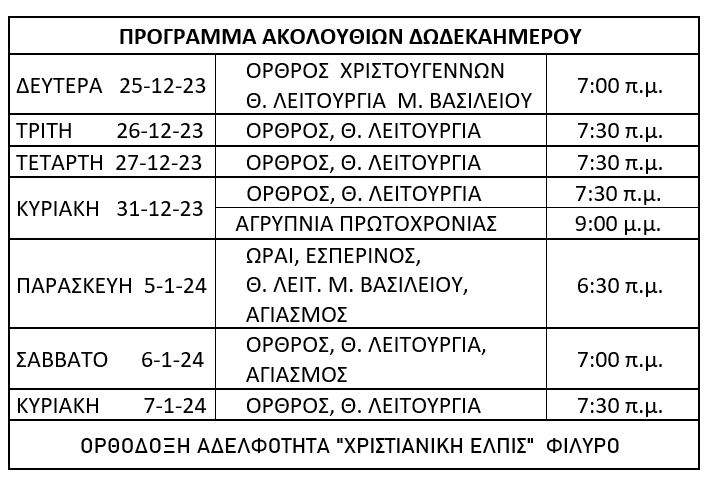
ΟΡΘ. ΑΔΕΛΦ. "ΧΡΙΣΤΙΑΝΙΚΗ ΕΛΠΙΣ", ΦΙΛΥΡΟ ΘΕΣ/ΝΙΚΗΣ
ΧΡΙΣΤΟΥΓΕΝΝΙΑΤΙΚΗ ΕΚΔΗΛΩΣΗ
ΑΙΘΟΥΣΑ "ΑΠΟΛΥΤΡΩΣΙΣ", Πέλοπος 7, Θεσ/νίκη
ΔΙΑΒΑΣΤΕ ΚΑΙ ΧΑΡΙΣΤΕ
 |
Ο ΜΕΓΑΛΟΣ ΕΠΙΣΚΕΠΤΗΣ
Στ. Ν. Σάκκου Ὁ Χριστός χτυπᾶ τήν πόρτα τῆς καρδιᾶς σου. Θά τοῦ ἀνοίξεις; Θεμελιακή ἡ σημασία τῆς ἀπάντησης σ' αὐτό τό ἐρώτημα. Σελίδες 148, ἔκδοση Β΄, βελτιωμένη & ἐπαυξημένη |
 |
Ο ΘΕΟΣ ΣΤΗ ΓΗ ΜΑΣ
Στ. Ν. Σάκκου Μία βαθυστόχαστη καί γλαφυρή ἐμβάθυνση στό μεγάλο γεγονός τῆς ἐνανθρωπήσεως τοῦ Κυρίου. Μία ὑπεύθυνη τοποθέτηση κάτω ἀπό τό φῶς τῆς Βηθλεέμ. Σελίδες 132, ἔκδοση Ε΄ |
 |
ΠΡΟΣΕΓΓΙΣΕΙΣ ΣΤΟΥΣ ΔΩΔΕΚΑ ΜΙΚΡΟΥΣ ΠΡΟΦΗΤΕΣ Μέ μεθοδικότητα, γλαφυρότητα καί ρεαλιστικότητα παρουσιάζεται ἡ ἐσωτερική δύναμη τοῦ προφητικοῦ λόγου καί ἠ διαχρονική ἐπικαιρότητά του. Σελίδες 236, ἔκδοση Α΄ |
 |
Ἑλένης Βασιλείου 17 χριστουγεννιάτικα καί 16 πρωτοχρονιάτικα διηγήματα, σελίδες 192. |
 |
Ἑλένης Βασιλείου 24 συναρπαστικά διηγήματα, πού προσφέρουν μία ζεστή καί τρυφερή προσέγγιση στό μεγάλο μήνυμα τῶν Χριστουγέννων. Σελίδες 164, ἔκδοση Στ΄ |
 |
ΑΠΟ ΤΗΝ ΣΕΙΡΑ "ΜΙΚΡΟΙ ΔΗΜΙΟΥΡΓΟΙ" ΤΕΥΧΟΣ Ζ΄ ΧΡΙΣΤΟΥΓΕΝΝΑ Δέσποινας Δαμιανίδου Σκηνές ἀπό τή χριστουγεννιάτικη ἱστορία γιά ἐξάσκηση στή ζωγραφική, παιχνίδια καί κατασκευές γιά εὐχάριστη ἐνασχόληση. ἔκδοση Α΄ |
Ζητῆστε τα στό Βιβλιοπωλεῖο "Ἀπολύτρωσις", τηλ. 2310 274518 ἤ μπεῖτε στό e-shop https://www.apolytrosis-books.gr/
Saint Spyridonas
Translation from the Book
Ὁ Θεός στήν ἱστορία τῆς Ἐκκλησίας, Βοήθημα Κατωτέρου Κατηχητικοῦ Γ΄,
ἐκδ. «Χριστιανική Ἐλπίς» Ὀρθόδοξη Ἀδελφότητα, Θεσσαλονίκη 2016, σσ. 72-77
(An opportunity for this lesson could be the preparation for the Christmas celebration).
Children, who were the first to hear about the birth of Christ? Yes, the simple and humble shepherds of Bethlehem. Today, we'll be talking about one such shepherd. He wasn't among those who saw the newborn Christ. He lived three centuries after Christ’s birth. With strong faith and a pure heart, he became a saint of our Church. His name was Spyridonas. We honor his memory every year on December 12th.
In the late 3rd century AD (around 270 AD), Spyridonas was born in Cyprus. His parents were shepherds who, despite being poor in wealth, were rich in faith and virtue. The latter gave to their son. Spyridonas did not receive proper education, but from a young age, he learned to believe in God and to love people. He was happy to help, serve and host others in his house. He also took joy in tending to his sheep with a simple and humble heart. His faith and virtue made him well-known not only in his hometown but also in the surrounding villages. People considered him as an example of a saint.
When the bishop of his hometown Trimythountas, passed away, all eyes turned to Spyridonas. His wife had already passed away (back in those days even married Christians could be bishops) and everyone was demanding for him to become their Bishop. But how could he, a humble shepherd turn into a Bishop? Despite his initial hesitation, he accepted to be a bishop only when he was convinced that it was not his fellow citizens but Christ Himself calling him to leave his sheep and become a shepherd of the Church’s flock.
So, Spyridonas, once a shepherd, became the Bishop of Trimythountas, his birthplace, in Cyprus. As a caring father, he tirelessly looked after all the faithful. God quickly allowed the greatness of his holiness to be revealed:
One day, during the Divine Liturgy, the faithful witnessed angels surrounding the Holy Altar and participating in the service alongside Saint Spyridonas! When the saint stepped out to the Royal Doors and said, “Peace to all,” the angels responded with the words the chanters say, “And with your spirit”!
Once, a poor man who had a big family, approached him in tears, seeking money to pay off a large debt. The lender had threatened to take away their house, leaving the children on the streets. Saint Spyridonas wondered where could he find such a large sum? Suddenly, right next to him, he noticed a snake crawling through the grass. As a thought crossed his mind about Aaron's rod, which turned into a serpent when thrown on the ground in Pharaoh's palace, he ardently prayed and raised his hand, “Oh Lord, let this snake turn into gold for this poor man!”. The snake stopped and Saint Spyridonas picked it up. In his hand, the reptile transformed into pure gold! Overjoyed, the poor man took the gold and hurried to repay his debt.
On another occasion, a woman came weeping to Saint Spyridonas, asking for a piece of jewellery she had given to his daughter to keep it safe. However, the daughter had passed away, and no one knew where the precious item was. The saint went to the daughter’s grave, prayed earnestly to God and then spoke to her as if she were alive: “Where did you put, my daughter, the woman’s jewellery?” From the grave, she responded and revealed the exact location where she had stored it!
Saint Spyridonas not only proved to be a miracle-worker but also a fighter of faith and a great theologian, despite he was a former shepherd.
In 325 AD, the Emperor Constantine called bishops from all regions of the great empire to gather in Nicaea, a city near Constantinople. This gathering, known as the First Ecumenical Council, brought together 318 Fathers of our Church, including Saint Spyridonas, to confront a major heretic, Arius. A heretic is someone who distorts and alters the truths of our faith. Arius, a presbyter and theologian, supported dangerous blasphemies, claiming that Christ is not God and that God is not Triune.
So, a serious debate arose between the holy Fathers and Arius. The most educated bishops engaged in a real battle, vigorously defending the truth. Saint Athanasius, who was still a young deacon at the time, passionately defended the truth with compelling arguments. In the end, Saint Spyridonas rose to speak, surprising everyone. Could this humble bishop take on the educated Arius?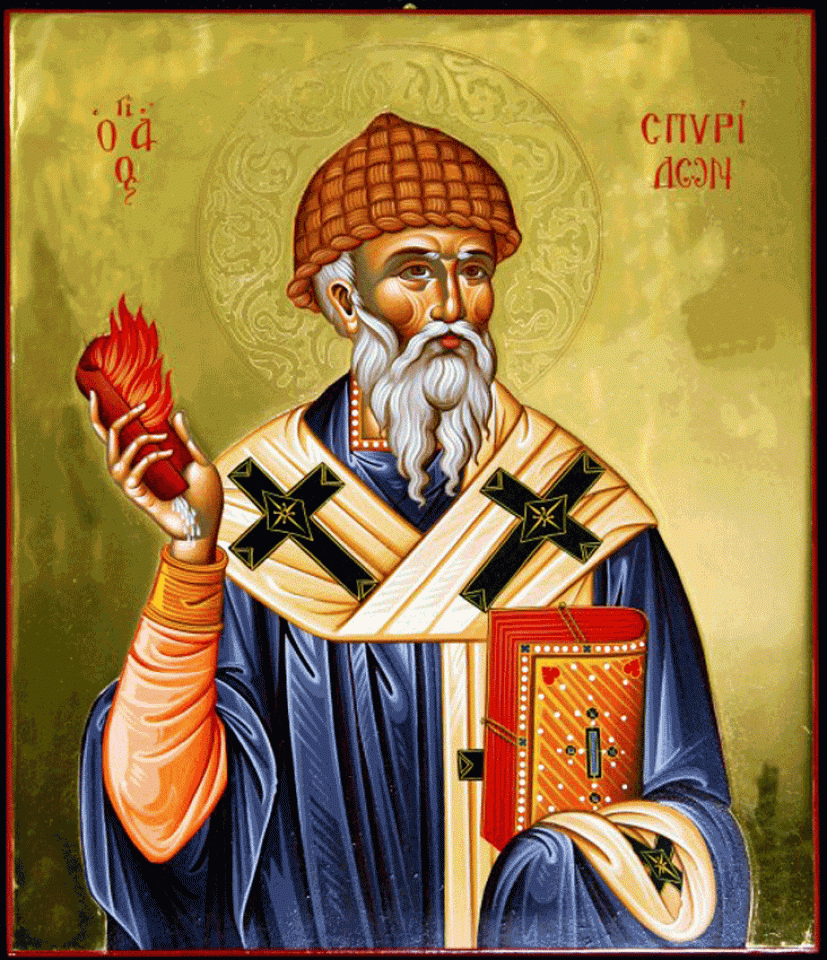 Holding a brick in his hands, Saint Spyridonas said to Arius, “Do you see this? It is one, but also three things together.” Then, he performed the sign of the Cross, saying loudly, “In the name of the Father and of the Son and of the Holy Spirit.” A miracle occurred: the brick split into three elements from which it was made. When the saint uttered “In the name of the Father,” everyone witnessed a flame rising to the sky. It was the fire used to bake the clay into the brick. He continued, “and of the Son,” and water poured from the brick. It was the water mixed with the clay to form the brick. Finally, he said, “and of the Holy Spirit,” and opening his hand, he showed the clay that had been used to make the brick. If a simple object, a brick, is made up of three materials that become one, what prevents God from being Triune, that is, three persons - Father, Son, and Holy Spirit - yet one God?
Holding a brick in his hands, Saint Spyridonas said to Arius, “Do you see this? It is one, but also three things together.” Then, he performed the sign of the Cross, saying loudly, “In the name of the Father and of the Son and of the Holy Spirit.” A miracle occurred: the brick split into three elements from which it was made. When the saint uttered “In the name of the Father,” everyone witnessed a flame rising to the sky. It was the fire used to bake the clay into the brick. He continued, “and of the Son,” and water poured from the brick. It was the water mixed with the clay to form the brick. Finally, he said, “and of the Holy Spirit,” and opening his hand, he showed the clay that had been used to make the brick. If a simple object, a brick, is made up of three materials that become one, what prevents God from being Triune, that is, three persons - Father, Son, and Holy Spirit - yet one God?
The miracle of the saint embarrassed Arius and his followers. The holy Fathers glorified God, who through this miraculous way, illuminated the truth.
The Trinitarian Doctrine
Children, this truth is the primary doctrine of our faith. Doctrines are the big truths in our faith that we can’t fully grasp with our minds, but we accept them as Christ revealed and the Holy Fathers of our Church taught us.
It’s crucial to know these doctrines and distinguish them from the errors of heretics because these truths guide us to salvation, into God’s embrace. Imagine following signs to reach your destination and ending up at a cliff because some people have changed them and don’t show the right way! Or consider taking medicine to get better, only to find out it’s been tampered with; it will surely harm us even more. It’s that bad when our faith truths are distorted. It’s essential to keep them unchanged, exactly as the Holy Fathers handed them down to us.
As mentioned earlier, the most significant doctrine of our faith is that God is Triune. Meaning, God is three persons—the Father, the Son, and the Holy Spirit—but only one God.
Unfortunately, even today, there are many heretics. The Witnesses of Jehovah, also known as Millennialists, support the error of Arianism. It’s tragic! They hold the Bible in their hands but reject the Holy Trinity. Yet, if you open the New Testament in Matthew, the last chapter, verse 19, Christ clearly instructs His disciples to baptize people “in the name of the Father and of the Son and of the Holy Spirit.”
Orthodox Christians confess their faith in the Holy Trinity every time they recite the Creed. Pay attention to what we're saying, “I believe in one God, the Father Almighty... And in one Lord Jesus Christ, the only begotten Son of God... And in the Holy Spirit, the Lord, the Giver of Life...”.
We also confess our faith every time we make the sign of the cross correctly. We join our three fingers to show precisely that God is three persons—Father, Son, and Holy Spirit—but one God.
Can you think of any prayers of our Church that reveal the Trinitarian doctrine? Here are a few examples:
• “In the name of the Father and of the Son and of the Holy Spirit”: One name because there is one God but three persons—Father, Son, and Holy Spirit.
• “Glory to the Father and to the Son and to the Holy Spirit”.
• “Holy God, Holy Mighty, Holy Immortal, have mercy on us”: We say “holy” three times because the one holy God is three persons.
Today, we will learn another short prayer, a hymn in which we ask for the mercy of the Triune God for the whole world:
“O Triune God, Father, Son, and Spirit, have mercy on the world”.
Note: At the end of the lesson, we could share the troparion of Saint Spyridon with the children and ask them to point out references to his miracles. The relics of Saint Spyridon are preserved intact in Corfu up to this day and continue to work miracles.
Copyright © 2021 by Orthodox Christian Association «ΧΡΙΣΤΙΑΝΙΚΗ ΕΛΠΙΣ» ΟΡΘΟΔΟΞΗ ΑΔΕΛΦΟΤΗΤΑ. All rights reserved.
St. Katherine
Translation from the Book
Ὁ Θεός στήν ἱστορία τῆς Ἐκκλησίας, Βοήθημα Κατωτέρου Κατηχητικοῦ Γ΄,
ἐκδ. «Χριστιανική Ἐλπίς» Ὀρθόδοξη Ἀδελφότητα, Θεσσαλονίκη 2016, σσ. 60-65
What would you like to be when you grow up? I’m sure you have heard this question plenty of times. Honestly, what kind of life do you dream of having? What do you value most and would like to acquire? People usually go after fame, riches, knowledge and beauty. Can anyone possess all these things together? Today, we will learn about a young girl who had everything people admire. She lived in Alexandria, in Egypt, near the end of the 3rd and the beginning of the 4th century AD.
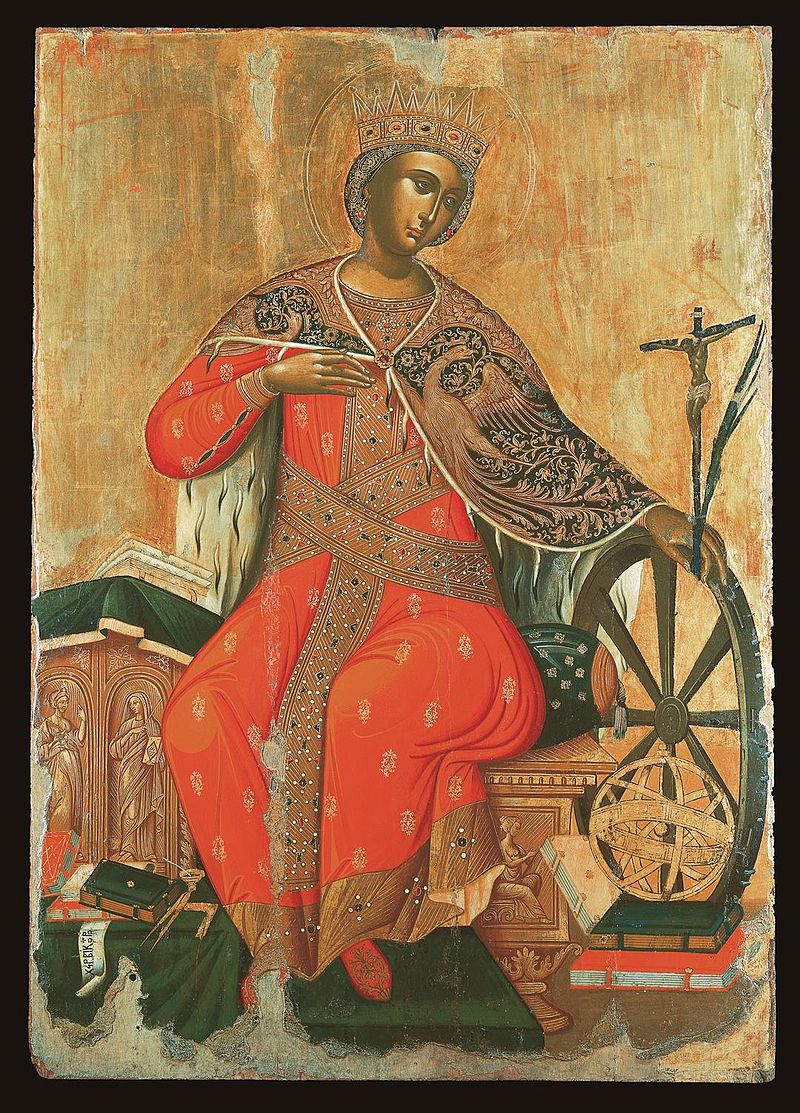 Katherine was beautiful, rich and intelligent. She was born in a noble and highly esteemed family, that offered her a superior education. From a young age she knew by heart texts written by ancient Greek and Latin poets and philosophers. She had studied the ancient rhetoricians, while she herself was very eloquent. Also, her knowledge in medicine was outstanding.
Katherine was beautiful, rich and intelligent. She was born in a noble and highly esteemed family, that offered her a superior education. From a young age she knew by heart texts written by ancient Greek and Latin poets and philosophers. She had studied the ancient rhetoricians, while she herself was very eloquent. Also, her knowledge in medicine was outstanding.
The city of Alexandria was amazed by Katherine’s qualities and talents. Everyone admired her beauty, wealth, nobility and knowledge. Who would be the lucky man to have the wise and beautiful Katherine as his wife? Many young men, who were themselves rich, educated and noble, had asked for her hand in marriage. She was the most sought-after bride in Alexandria.
Katherine, however, loved Jesus Christ with all her heart and she wanted to dedicate all her life to Him. Who else could have as much beauty, riches, nobility and wisdom as our Lord Jesus Christ? Therefore, she was extremely happy to be converted from an idolater to a Christian.
She lived in difficult times, however; the times when Christians were persecuted for their faith. An imperial decree was sent to Alexandria: Everybody had to offer a sacrifice to the idols. Should anyone refuse to do so, would be severely punished. What did Katherine do? Did she offer the sacrifice? Of course not! Katherine worshipped the one and only God, Lord Jesus Christ. She bravely confessed her faith in Christ.
Emperor Maximian was informed about it and felt sorry for her. Lord Konstas’ famous daughter, known to everybody for her knowledge and wisdom, would be so imprudent as to look down on his imperial decree and insult the official sacrifice of the state in such a way!
He decided to try every possible means in order to alter her decision. During a visit to Alexandria, he invited fifty (some sources claim a hundred and fifty) wise rhetoricians to converse with her, and convince her to renounce her Christian faith. He was sure that their arguments would manage to change Katherine’s faith. The outcome, however, was the opposite. A unique fight took place, not with weapons but with words. Who were the two armies? On one side, stood the fifty most intelligent and wise of Alexandria, on the other, a young girl. Even so, wise Katherine was not afraid; she was speaking with the power of the Holy Spirit! She left all her fifty adversaries speechless! She proved that it was incredibly silly to worship idols, created by people, as gods. There is only one true God, who became a man to save us. He is Lord Jesus Christ and He does not have any need of animal sacrifices, but He only wants us to follow His commandments.
Katherine won against her adversaries. They had nothing to say to defend their false gods. They acknowledged that the young Christian’s faith was true. They believed in Christ and asked to be baptized.
You can understand how angry the emperor was. He ordered that they should all die. All the fifty of them became martyrs for Christ!
The emperor ordered for Katherine to be imprisoned and whipped. He was determined to torture her until she would yield and deny her faith. Katherine, however, remained stable, she did not deny Christ. She was ready to endure the worst of tortures for His love.
In prison, she received an unexpected visitor. Suddenly, the door of her prison opened and in comes the empress, Faustina. Why had she come to prison? Faustina had heard about Katherine, this wise young girl, everyone in Alexandria admired. She had also learned about her debate with the rhetoricians and was greatly impressed. She was moved by the tortures Katherine had endured in prison as well. She admired her courage and patience. For these reasons, she wanted to meet her herself. So, she was now, right in front of her.
Katherine did not throw away this chance. So, what if she was in a dark and dreadful prison. She talked to Faustina about Lord Jesus Christ, whom she loved and believed. The result? Alexandria was astonished with the news: The empress became a Christian! Along with her, thanks to Katherine, the prison guard Porfyrios and 200 soldiers became Christians as well!
The emperor raged like an untamed beast! He ordered that his wife, Porfyrios and the 200 soldiers should be killed. All of them became martyrs for believing in Christ!
He ordered to tie Katherine on a wheel with sharp iron spikes. Every turn would tear her skin. God, however, performed a miracle: Katherine remained unharmed from the wheel. The emperor saw that nothing could make the young Christian girl deny her faith, so he ordered to cut off her head. It was the 25th of November. On her feast day we celebrate Saint Faustina, Saint Porfyrios, and the 200 soldier martyrs, too.
Loving Christ
Saint Katherine, as we mentioned above, had all those endowments that people are jealous of. What are they? Beauty, wealth, fame, wisdom. All those gifts, however, easily wither and disappear. For how many years can people remain beautiful? Have you ever thought about how many rich people lost their wealth at some point? How many others lost their high positions and fame? How many have seen their knowledge be torn apart by new discoveries?
So, we do not honor Saint Katherine for her endowments. We venerate her because she loved Christ above all, that was her greatest virtue and the reason why she was honored to be a martyr. This love for Christ was what made her endure such horrible tortures and give her life for her faith. She managed with this love to convert so many idolaters to Christianity! This is why we keep her memory throughout the centuries; there are many girls named after her, we venerate her icon, many churches are dedicated to her. The Holy Monastery of Saint Katherine on mountain Sinai is well-known. Each year, many pious pilgrims visit it.
The greatest honor, however, for St. Katherine is to try and be like her. Could we reach such a goal? Yes, if the goal of our lives is to love Christ as much as she did. However, in our days there are no persecutions for us to be martyrs for Christ! Is there a way for us to show Him our love? Of course, there is! He told us so Himself: “If you love Me, keep My commandments” (Jn 14:15). For those we love we are ready to do anything for them, isn’t it so? We happily agree to do what they wish. So, let’s ask Christ plenty of times a day: My Lord:
- Do You like what I am watching right now?
- Do You like what I am listening to?
- Do You like what I am doing?
- Do You like what I am saying?
- Do You like the place I am planning to go to?
- Do You agree with the friends I keep?
The ones who try to do what Christ wishes are indeed admirable! They do not get carried away by the evil they see around them; they do not pay attention to other people’s behaviour. They love Christ and the only thing that matters is this: to keep His commandments. These are the ones that the angels and Saint Katherine and all the saints are proud of! These are the ones that Christ Himself will celebrate and crown them!
Like Saint Katherine did,
I take as my life’s goal,
any secret or known deed,
to be liked by God!
Copyright © 2021 by Orthodox Christian Association «ΧΡΙΣΤΙΑΝΙΚΗ ΕΛΠΙΣ» ΟΡΘΟΔΟΞΗ ΑΔΕΛΦΟΤΗΤΑ. All rights reserved.
Saint Dimitrios
Translation from the Book
Ὁ Θεός στήν ἱστορία τῆς Ἐκκλησίας, Βοήθημα Κατωτέρου Κατηχητικοῦ Γ΄,
ἐκδ. «Χριστιανική Ἐλπίς» Ὀρθόδοξη Ἀδελφότητα, Θεσσαλονίκη 2016, σσ. 36-41
There is a special calendar called “Agiologio”, which shows the names of the saints who are celebrated each day. Some Christians have the pious habit of reading them every day so, when they pray, they ask these saints for their help. Indeed, our lives would be wonderful if we got used to the company of the saints instead of spending our time in games, Facebook, magazines and comics. What if these saints and their fascinating lives became our role models?
Today we are going to stand before the figure of a saint who was a Catechist, a teacher of the Sunday school. On his name day we also celebrate the Sunday school, the people teaching in it and all the younger or older people who attend it and love it.
Thessaloniki 280 AD. The city was under the Roman rule. The emperor was Galerius Valerius Maximianus, an idolater who fiercely persecuted the Christians. He imprisoned them, tortured them and executed them because of their faith. Dimitrios was born in this unhospitable for the Christians world. He was an offspring of an aristocratic family and he was going to be an ardent fighter of Christ.
When he grew up, he turned out to be a handsome young man with unique features and virtues. He was intelligent but humble. He had leadership skills and politeness. He had a brave and heroic heart. He prayed, he studied the Holy Bible and he fasted. He never missed the Divine Liturgy and communed Jesus’ Holy Blood and Body as often as possible.
He stood out from the young people who lived in the city. Everybody respected and appreciated him, not only for his significant social class but for his behaviour as a Christian, as well. The Christians held him at a special place in their heart because he was their teacher and Catechist!
Every day, defying the risk of being arrested, he taught people to believe in God. His heart was burning with the desire to give an opportunity to all the people to learn about the true God. This was his biggest goal: every day to encourage an idolater to become a Christian, to lead a person towards Christ! So, every day he taught at the Sunday school and kindled the flame of faith during the difficult times of persecutions. He arranged secret meetings in Katafigi, which was one of the galleries of the ancient market in the center of Thessaloniki. The church of Panagia Chalkeon is located there today. His words full of God's grace, excited people of all ages. Thanks to him a lot of souls met and loved Christ!
Such a great effort could not stay hidden for a long time. 303 AD. The emperor arrived in Thessaloniki. The idolaters who were jealous of Dimitrios grasped the chance and denounced him. As a result, the emperor put him in prison.
The ardent Catechist was arrested the moment he was teaching the Gospel. They led him before the emperor who had just entered the stadium to watch the duels between the gladiators in his honour. The stadium was located where the church of Saint Dimitrios looms today. The emperor ordered to imprison temporarily the young Catechist in the changing room under the stadium, so that he could deal with him later.
The duels began. An idolater, a gigantic gladiator, appeared in the center of the stadium. His name was Lyaios and he challenged the Christians to a duel with him. His words were full of hatred and scorn for Christ and His followers. Nestoras, who was a catechumen of Dimitrios, heard him. When Dimitrios got arrested, he was at the Sunday school so he followed him to the stadium. He hadn’t been baptized yet. But he could not stand hearing these insults to Christ. So, he decided to fight Lyaios. He didn't mind that he was small and weak. He had the greatest ally; God. He ran to his Catechist in prison and asked for his blessing. Dimitrios gave him his blessing and said the prophetic words: “Not only will you beat Lyaios but also you will become a martyr of Christ.”
Lyaios laughed at his opponent. Nestoras prayed: “God of Dimitrios help me”. The duel began and Nestoras beat him before the astonished spectators! The giant was lying dead in the middle of the arena and the whole stadium was shaken by the cheer of the crowd.
The emperor became furious when he was informed that Nestoras was a follower of Dimitrios. Christ’s young athlete did not gain a crown from the emperor. Instead, he had the honor of becoming a martyr, as Dimitrios had foretold him. He was given the crown of eternal glory by Christ.
Maximianus’ rage wasn't satisfied. He wanted to punish the person who was really responsible for the humiliation of the idolaters. He ordered his soldiers to execute Dimitrios. A few minutes later they hit Dimitrios with their spears. His blood flew like a river. Christ bestowed to him the crown of the heavenly glory along with his catechumen.
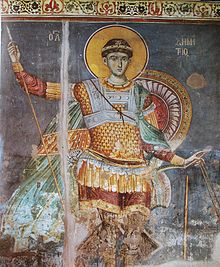 Dimitrios was glorified on earth too. His relic has had the blessing to spring myrrh several times. He has also cured a lot of sick people and has helped his favorite city Thessaloniki in miraculous ways. He is the patron saint of Thessaloniki. It isn't a coincidence that Thessaloniki declared her freedom after five hundred years under the Turkish yoke on the day we celebrate his memory. The citizens of Thessaloniki always faithfully seek his help in difficult times, like earthquakes or famine and get his help.
Dimitrios was glorified on earth too. His relic has had the blessing to spring myrrh several times. He has also cured a lot of sick people and has helped his favorite city Thessaloniki in miraculous ways. He is the patron saint of Thessaloniki. It isn't a coincidence that Thessaloniki declared her freedom after five hundred years under the Turkish yoke on the day we celebrate his memory. The citizens of Thessaloniki always faithfully seek his help in difficult times, like earthquakes or famine and get his help.
The Orthodox Church celebrates Saint Dimitrios on the 26th of October and Saint Nestoras on the 27th.
Fragrant pigeons
In the past when people wanted to catch wild pigeons, they used to put perfume on the wings of domesticated pigeons and let them fly free. When these pigeons returned to the dovecote, they were followed by wild ones who had been attracted by their delightful fragrance. Dimitrios was like these pigeons. He led many idolaters to Christ’s truth with his “fragrant” life and words. He would be so happy if he saw people who attend the Sunday school spread the same fragrance around them and lead others to Christ. Don't miss the opportunity to talk to others about Christ! Show to the world with your behaviour and your actions that the Christian life is beautiful! Find ways to invite people to the Sunday school! Christ’s myrrh is for everybody. We should spread it in our house, our neighbourhood, our community, our workplace, our city and make Saint Dimitrios proud.
The Christ’s myrrh
I apply on my wings
that all will come to Him
joy to my heart brings.
Copyright © 2021 by Orthodox Christian Association «ΧΡΙΣΤΙΑΝΙΚΗ ΕΛΠΙΣ» ΟΡΘΟΔΟΞΗ ΑΔΕΛΦΟΤΗΤΑ. All rights reserved.
